International Business in China: A Cultural and Business Analysis
VerifiedAdded on 2023/06/15
|15
|3313
|492
Report
AI Summary
This report provides a comprehensive analysis of the cultural and business environment in China, focusing on key aspects relevant to international business ventures. It begins with an introduction to China as a host country, highlighting its economic growth and favorable business conditions. The report delves into a detailed cultural analysis, covering religion, language, social stratification, political life, and values, and etiquettes. It further explores the business culture of China, comparing it with that of Singapore, with a focus on business communication, gift-giving, teamwork, meetings, and business relationships. The analysis includes a discussion of Hofstede’s five cultural dimensions (Power Distance, Individualism vs. Collectivism, Uncertainty Avoidance, Masculinity vs. Femininity, and Long-Term vs. Short-Term Orientation) to compare the business cultures of China and Singapore. The report concludes by emphasizing the importance of understanding these cultural and business nuances for successful international business operations in China.
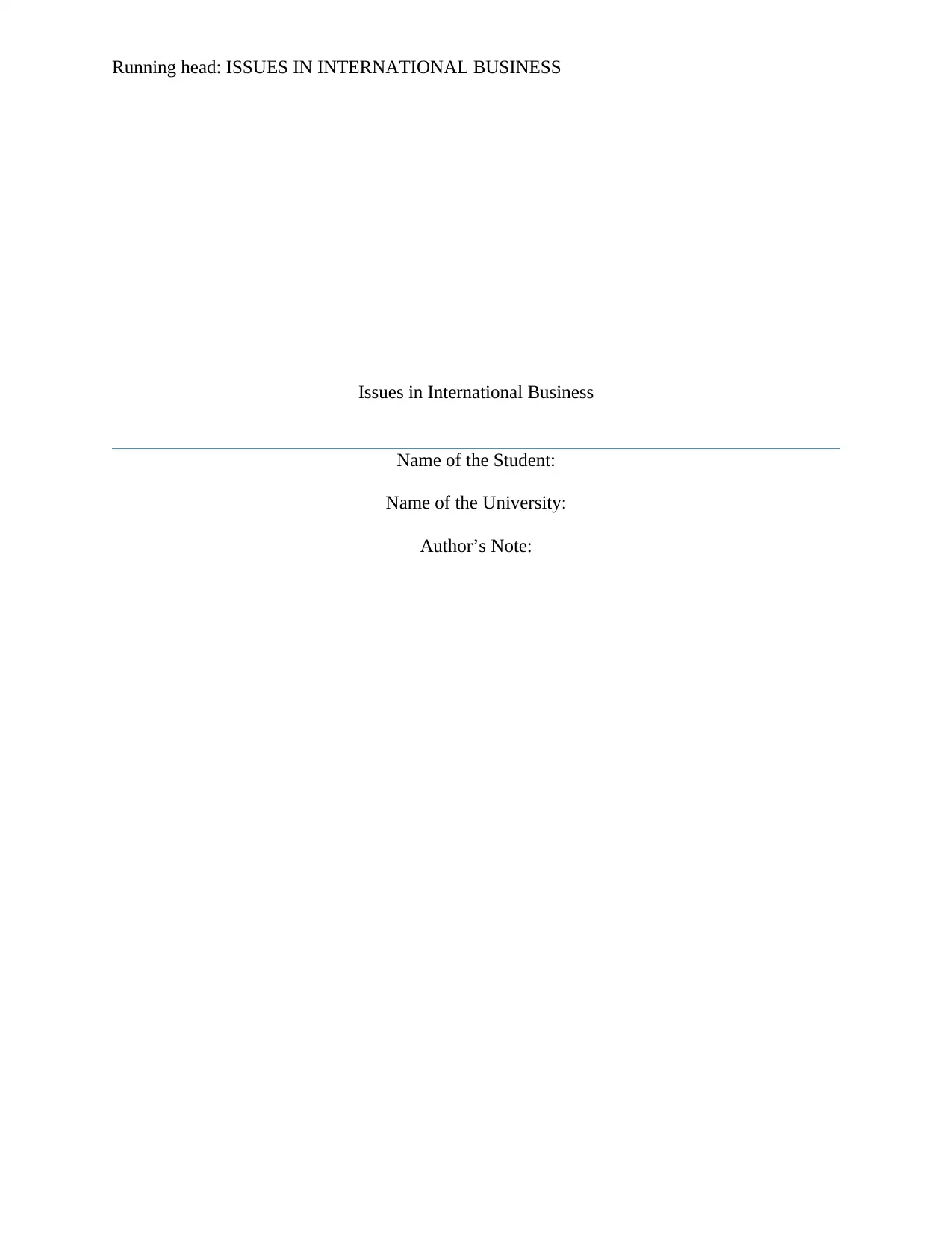
Running head: ISSUES IN INTERNATIONAL BUSINESS
Issues in International Business
Name of the Student:
Name of the University:
Author’s Note:
Issues in International Business
Name of the Student:
Name of the University:
Author’s Note:
Paraphrase This Document
Need a fresh take? Get an instant paraphrase of this document with our AI Paraphraser
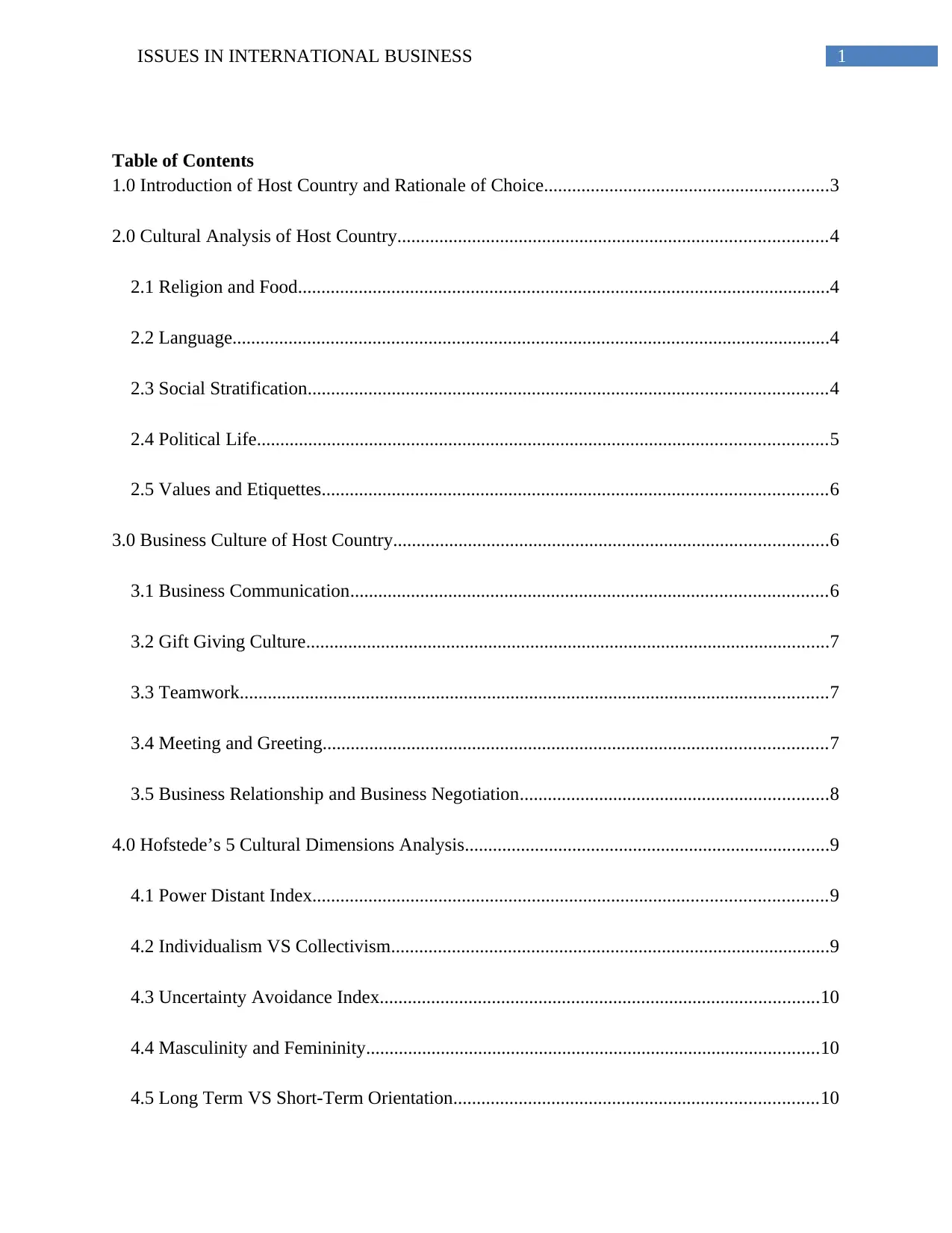
1ISSUES IN INTERNATIONAL BUSINESS
Table of Contents
1.0 Introduction of Host Country and Rationale of Choice.............................................................3
2.0 Cultural Analysis of Host Country............................................................................................4
2.1 Religion and Food..................................................................................................................4
2.2 Language................................................................................................................................4
2.3 Social Stratification...............................................................................................................4
2.4 Political Life..........................................................................................................................5
2.5 Values and Etiquettes............................................................................................................6
3.0 Business Culture of Host Country.............................................................................................6
3.1 Business Communication......................................................................................................6
3.2 Gift Giving Culture................................................................................................................7
3.3 Teamwork..............................................................................................................................7
3.4 Meeting and Greeting............................................................................................................7
3.5 Business Relationship and Business Negotiation..................................................................8
4.0 Hofstede’s 5 Cultural Dimensions Analysis..............................................................................9
4.1 Power Distant Index..............................................................................................................9
4.2 Individualism VS Collectivism..............................................................................................9
4.3 Uncertainty Avoidance Index..............................................................................................10
4.4 Masculinity and Femininity.................................................................................................10
4.5 Long Term VS Short-Term Orientation..............................................................................10
Table of Contents
1.0 Introduction of Host Country and Rationale of Choice.............................................................3
2.0 Cultural Analysis of Host Country............................................................................................4
2.1 Religion and Food..................................................................................................................4
2.2 Language................................................................................................................................4
2.3 Social Stratification...............................................................................................................4
2.4 Political Life..........................................................................................................................5
2.5 Values and Etiquettes............................................................................................................6
3.0 Business Culture of Host Country.............................................................................................6
3.1 Business Communication......................................................................................................6
3.2 Gift Giving Culture................................................................................................................7
3.3 Teamwork..............................................................................................................................7
3.4 Meeting and Greeting............................................................................................................7
3.5 Business Relationship and Business Negotiation..................................................................8
4.0 Hofstede’s 5 Cultural Dimensions Analysis..............................................................................9
4.1 Power Distant Index..............................................................................................................9
4.2 Individualism VS Collectivism..............................................................................................9
4.3 Uncertainty Avoidance Index..............................................................................................10
4.4 Masculinity and Femininity.................................................................................................10
4.5 Long Term VS Short-Term Orientation..............................................................................10
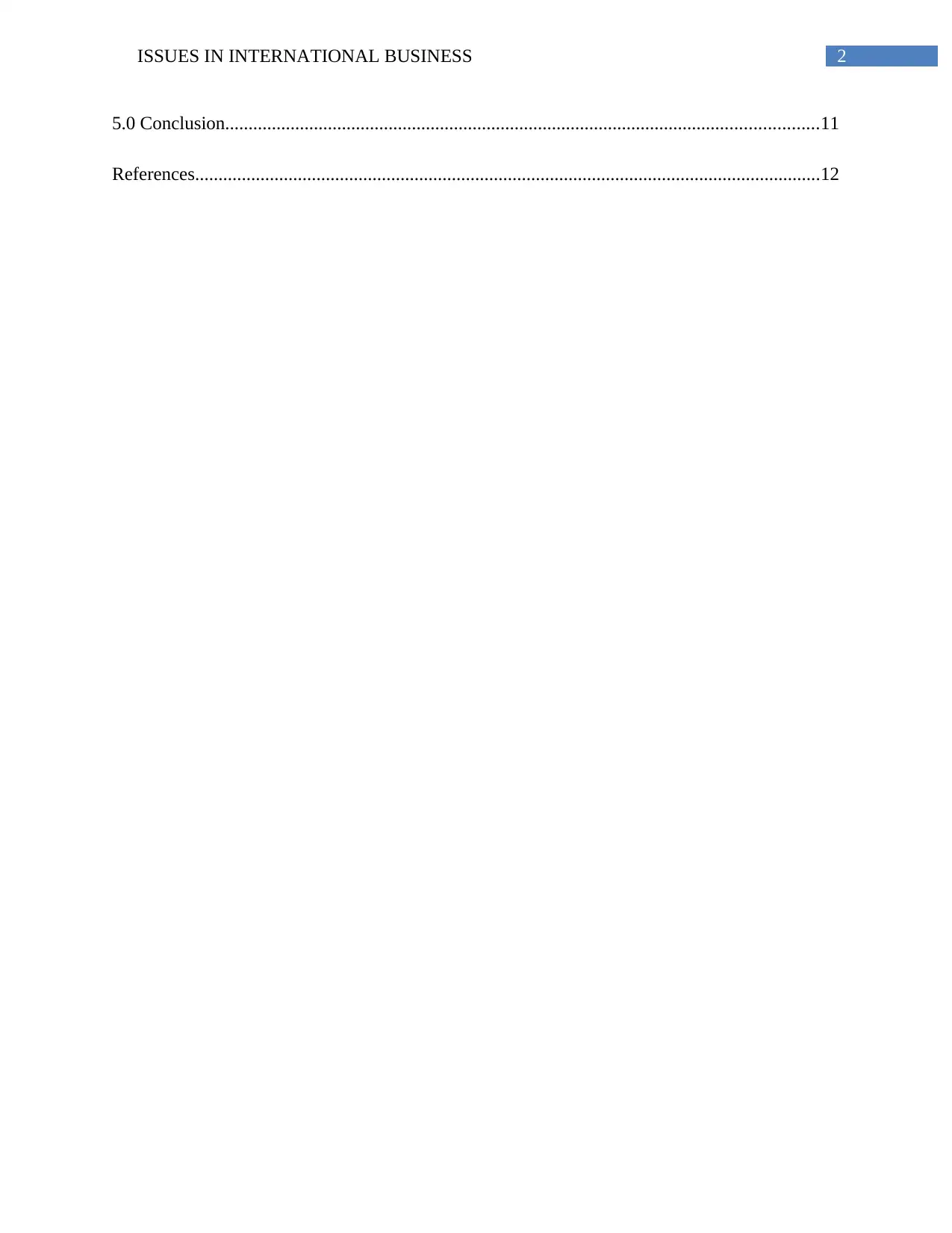
2ISSUES IN INTERNATIONAL BUSINESS
5.0 Conclusion...............................................................................................................................11
References......................................................................................................................................12
5.0 Conclusion...............................................................................................................................11
References......................................................................................................................................12
⊘ This is a preview!⊘
Do you want full access?
Subscribe today to unlock all pages.

Trusted by 1+ million students worldwide
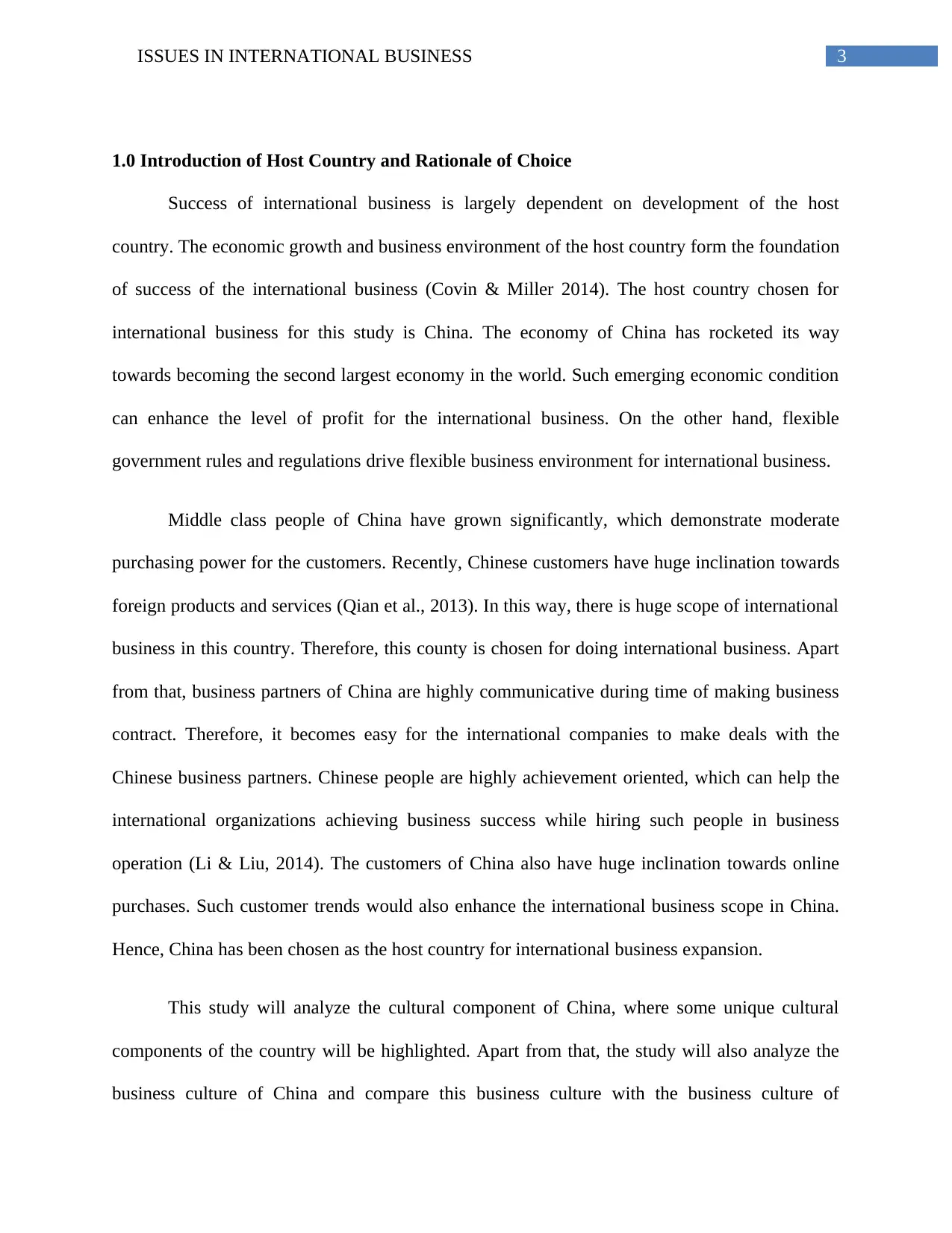
3ISSUES IN INTERNATIONAL BUSINESS
1.0 Introduction of Host Country and Rationale of Choice
Success of international business is largely dependent on development of the host
country. The economic growth and business environment of the host country form the foundation
of success of the international business (Covin & Miller 2014). The host country chosen for
international business for this study is China. The economy of China has rocketed its way
towards becoming the second largest economy in the world. Such emerging economic condition
can enhance the level of profit for the international business. On the other hand, flexible
government rules and regulations drive flexible business environment for international business.
Middle class people of China have grown significantly, which demonstrate moderate
purchasing power for the customers. Recently, Chinese customers have huge inclination towards
foreign products and services (Qian et al., 2013). In this way, there is huge scope of international
business in this country. Therefore, this county is chosen for doing international business. Apart
from that, business partners of China are highly communicative during time of making business
contract. Therefore, it becomes easy for the international companies to make deals with the
Chinese business partners. Chinese people are highly achievement oriented, which can help the
international organizations achieving business success while hiring such people in business
operation (Li & Liu, 2014). The customers of China also have huge inclination towards online
purchases. Such customer trends would also enhance the international business scope in China.
Hence, China has been chosen as the host country for international business expansion.
This study will analyze the cultural component of China, where some unique cultural
components of the country will be highlighted. Apart from that, the study will also analyze the
business culture of China and compare this business culture with the business culture of
1.0 Introduction of Host Country and Rationale of Choice
Success of international business is largely dependent on development of the host
country. The economic growth and business environment of the host country form the foundation
of success of the international business (Covin & Miller 2014). The host country chosen for
international business for this study is China. The economy of China has rocketed its way
towards becoming the second largest economy in the world. Such emerging economic condition
can enhance the level of profit for the international business. On the other hand, flexible
government rules and regulations drive flexible business environment for international business.
Middle class people of China have grown significantly, which demonstrate moderate
purchasing power for the customers. Recently, Chinese customers have huge inclination towards
foreign products and services (Qian et al., 2013). In this way, there is huge scope of international
business in this country. Therefore, this county is chosen for doing international business. Apart
from that, business partners of China are highly communicative during time of making business
contract. Therefore, it becomes easy for the international companies to make deals with the
Chinese business partners. Chinese people are highly achievement oriented, which can help the
international organizations achieving business success while hiring such people in business
operation (Li & Liu, 2014). The customers of China also have huge inclination towards online
purchases. Such customer trends would also enhance the international business scope in China.
Hence, China has been chosen as the host country for international business expansion.
This study will analyze the cultural component of China, where some unique cultural
components of the country will be highlighted. Apart from that, the study will also analyze the
business culture of China and compare this business culture with the business culture of
Paraphrase This Document
Need a fresh take? Get an instant paraphrase of this document with our AI Paraphraser
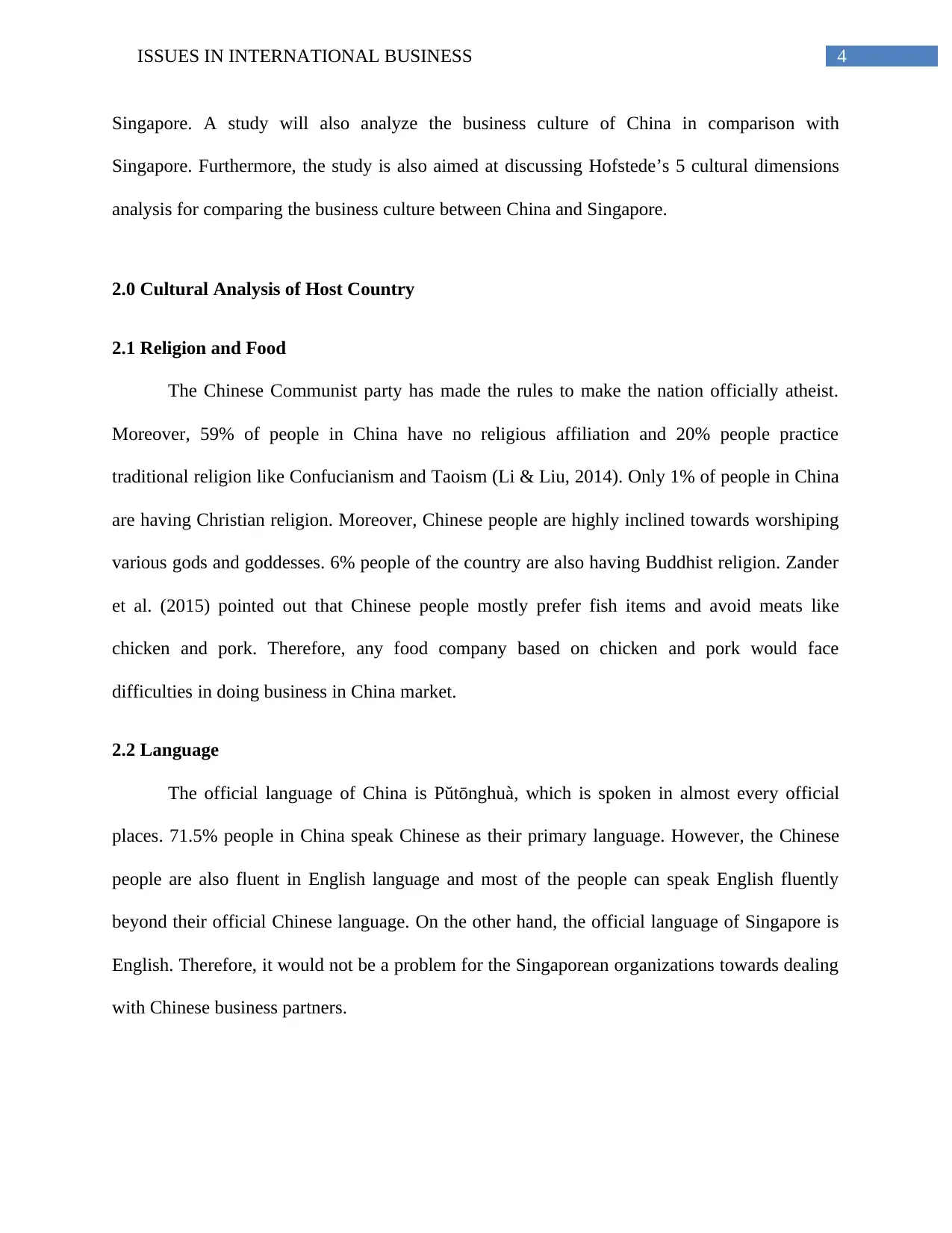
4ISSUES IN INTERNATIONAL BUSINESS
Singapore. A study will also analyze the business culture of China in comparison with
Singapore. Furthermore, the study is also aimed at discussing Hofstede’s 5 cultural dimensions
analysis for comparing the business culture between China and Singapore.
2.0 Cultural Analysis of Host Country
2.1 Religion and Food
The Chinese Communist party has made the rules to make the nation officially atheist.
Moreover, 59% of people in China have no religious affiliation and 20% people practice
traditional religion like Confucianism and Taoism (Li & Liu, 2014). Only 1% of people in China
are having Christian religion. Moreover, Chinese people are highly inclined towards worshiping
various gods and goddesses. 6% people of the country are also having Buddhist religion. Zander
et al. (2015) pointed out that Chinese people mostly prefer fish items and avoid meats like
chicken and pork. Therefore, any food company based on chicken and pork would face
difficulties in doing business in China market.
2.2 Language
The official language of China is Pŭtōnghuà, which is spoken in almost every official
places. 71.5% people in China speak Chinese as their primary language. However, the Chinese
people are also fluent in English language and most of the people can speak English fluently
beyond their official Chinese language. On the other hand, the official language of Singapore is
English. Therefore, it would not be a problem for the Singaporean organizations towards dealing
with Chinese business partners.
Singapore. A study will also analyze the business culture of China in comparison with
Singapore. Furthermore, the study is also aimed at discussing Hofstede’s 5 cultural dimensions
analysis for comparing the business culture between China and Singapore.
2.0 Cultural Analysis of Host Country
2.1 Religion and Food
The Chinese Communist party has made the rules to make the nation officially atheist.
Moreover, 59% of people in China have no religious affiliation and 20% people practice
traditional religion like Confucianism and Taoism (Li & Liu, 2014). Only 1% of people in China
are having Christian religion. Moreover, Chinese people are highly inclined towards worshiping
various gods and goddesses. 6% people of the country are also having Buddhist religion. Zander
et al. (2015) pointed out that Chinese people mostly prefer fish items and avoid meats like
chicken and pork. Therefore, any food company based on chicken and pork would face
difficulties in doing business in China market.
2.2 Language
The official language of China is Pŭtōnghuà, which is spoken in almost every official
places. 71.5% people in China speak Chinese as their primary language. However, the Chinese
people are also fluent in English language and most of the people can speak English fluently
beyond their official Chinese language. On the other hand, the official language of Singapore is
English. Therefore, it would not be a problem for the Singaporean organizations towards dealing
with Chinese business partners.
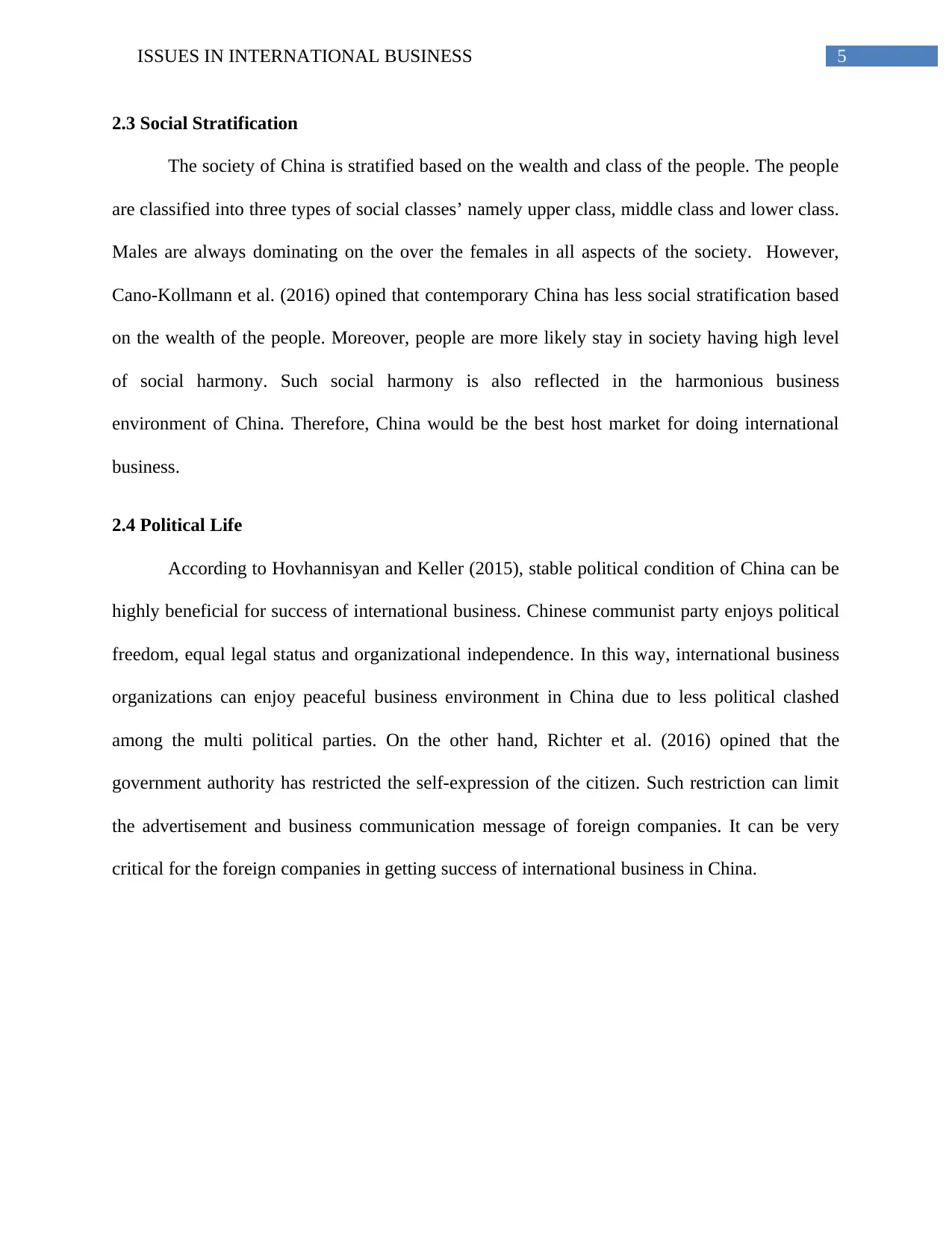
5ISSUES IN INTERNATIONAL BUSINESS
2.3 Social Stratification
The society of China is stratified based on the wealth and class of the people. The people
are classified into three types of social classes’ namely upper class, middle class and lower class.
Males are always dominating on the over the females in all aspects of the society. However,
Cano-Kollmann et al. (2016) opined that contemporary China has less social stratification based
on the wealth of the people. Moreover, people are more likely stay in society having high level
of social harmony. Such social harmony is also reflected in the harmonious business
environment of China. Therefore, China would be the best host market for doing international
business.
2.4 Political Life
According to Hovhannisyan and Keller (2015), stable political condition of China can be
highly beneficial for success of international business. Chinese communist party enjoys political
freedom, equal legal status and organizational independence. In this way, international business
organizations can enjoy peaceful business environment in China due to less political clashed
among the multi political parties. On the other hand, Richter et al. (2016) opined that the
government authority has restricted the self-expression of the citizen. Such restriction can limit
the advertisement and business communication message of foreign companies. It can be very
critical for the foreign companies in getting success of international business in China.
2.3 Social Stratification
The society of China is stratified based on the wealth and class of the people. The people
are classified into three types of social classes’ namely upper class, middle class and lower class.
Males are always dominating on the over the females in all aspects of the society. However,
Cano-Kollmann et al. (2016) opined that contemporary China has less social stratification based
on the wealth of the people. Moreover, people are more likely stay in society having high level
of social harmony. Such social harmony is also reflected in the harmonious business
environment of China. Therefore, China would be the best host market for doing international
business.
2.4 Political Life
According to Hovhannisyan and Keller (2015), stable political condition of China can be
highly beneficial for success of international business. Chinese communist party enjoys political
freedom, equal legal status and organizational independence. In this way, international business
organizations can enjoy peaceful business environment in China due to less political clashed
among the multi political parties. On the other hand, Richter et al. (2016) opined that the
government authority has restricted the self-expression of the citizen. Such restriction can limit
the advertisement and business communication message of foreign companies. It can be very
critical for the foreign companies in getting success of international business in China.
⊘ This is a preview!⊘
Do you want full access?
Subscribe today to unlock all pages.

Trusted by 1+ million students worldwide
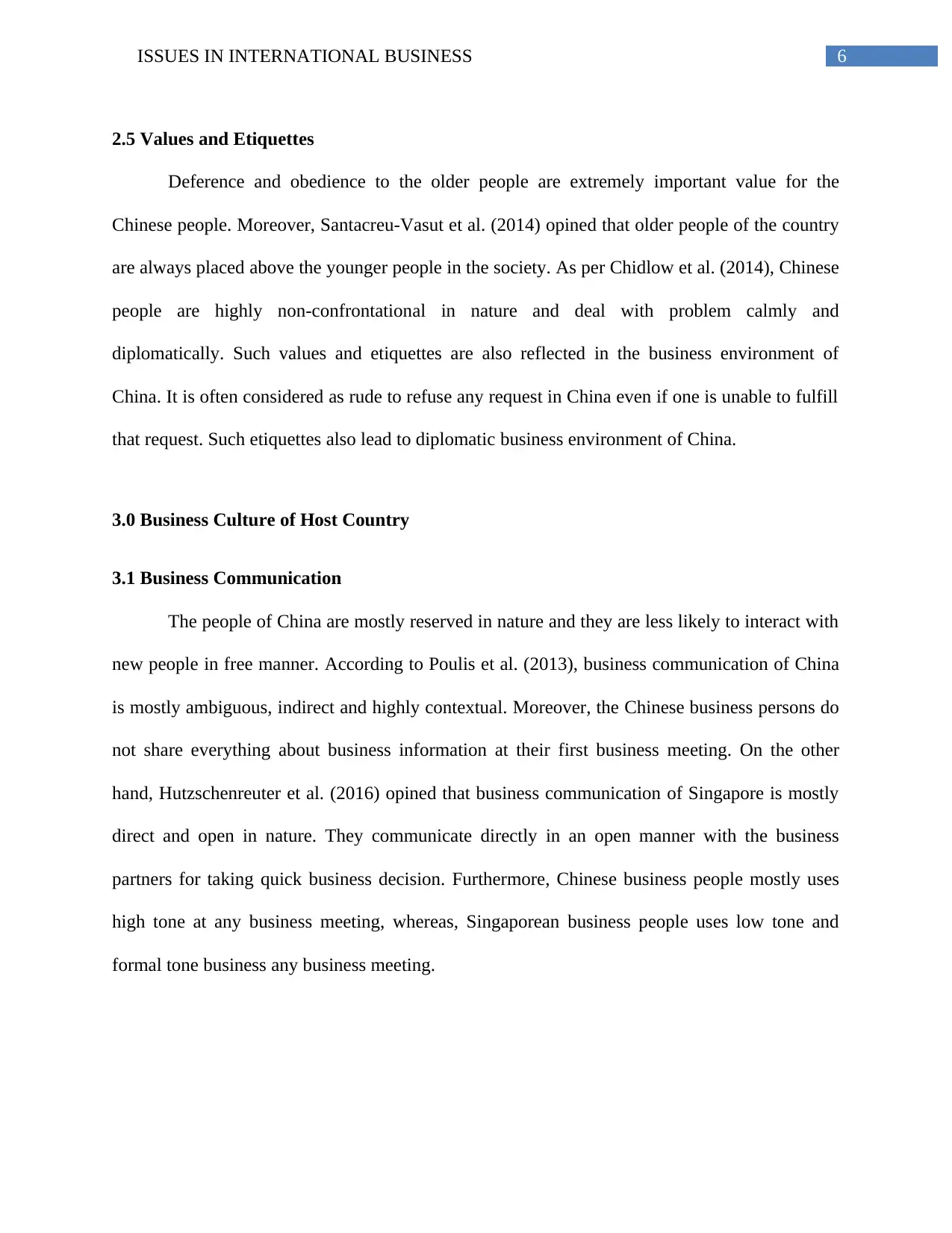
6ISSUES IN INTERNATIONAL BUSINESS
2.5 Values and Etiquettes
Deference and obedience to the older people are extremely important value for the
Chinese people. Moreover, Santacreu-Vasut et al. (2014) opined that older people of the country
are always placed above the younger people in the society. As per Chidlow et al. (2014), Chinese
people are highly non-confrontational in nature and deal with problem calmly and
diplomatically. Such values and etiquettes are also reflected in the business environment of
China. It is often considered as rude to refuse any request in China even if one is unable to fulfill
that request. Such etiquettes also lead to diplomatic business environment of China.
3.0 Business Culture of Host Country
3.1 Business Communication
The people of China are mostly reserved in nature and they are less likely to interact with
new people in free manner. According to Poulis et al. (2013), business communication of China
is mostly ambiguous, indirect and highly contextual. Moreover, the Chinese business persons do
not share everything about business information at their first business meeting. On the other
hand, Hutzschenreuter et al. (2016) opined that business communication of Singapore is mostly
direct and open in nature. They communicate directly in an open manner with the business
partners for taking quick business decision. Furthermore, Chinese business people mostly uses
high tone at any business meeting, whereas, Singaporean business people uses low tone and
formal tone business any business meeting.
2.5 Values and Etiquettes
Deference and obedience to the older people are extremely important value for the
Chinese people. Moreover, Santacreu-Vasut et al. (2014) opined that older people of the country
are always placed above the younger people in the society. As per Chidlow et al. (2014), Chinese
people are highly non-confrontational in nature and deal with problem calmly and
diplomatically. Such values and etiquettes are also reflected in the business environment of
China. It is often considered as rude to refuse any request in China even if one is unable to fulfill
that request. Such etiquettes also lead to diplomatic business environment of China.
3.0 Business Culture of Host Country
3.1 Business Communication
The people of China are mostly reserved in nature and they are less likely to interact with
new people in free manner. According to Poulis et al. (2013), business communication of China
is mostly ambiguous, indirect and highly contextual. Moreover, the Chinese business persons do
not share everything about business information at their first business meeting. On the other
hand, Hutzschenreuter et al. (2016) opined that business communication of Singapore is mostly
direct and open in nature. They communicate directly in an open manner with the business
partners for taking quick business decision. Furthermore, Chinese business people mostly uses
high tone at any business meeting, whereas, Singaporean business people uses low tone and
formal tone business any business meeting.
Paraphrase This Document
Need a fresh take? Get an instant paraphrase of this document with our AI Paraphraser
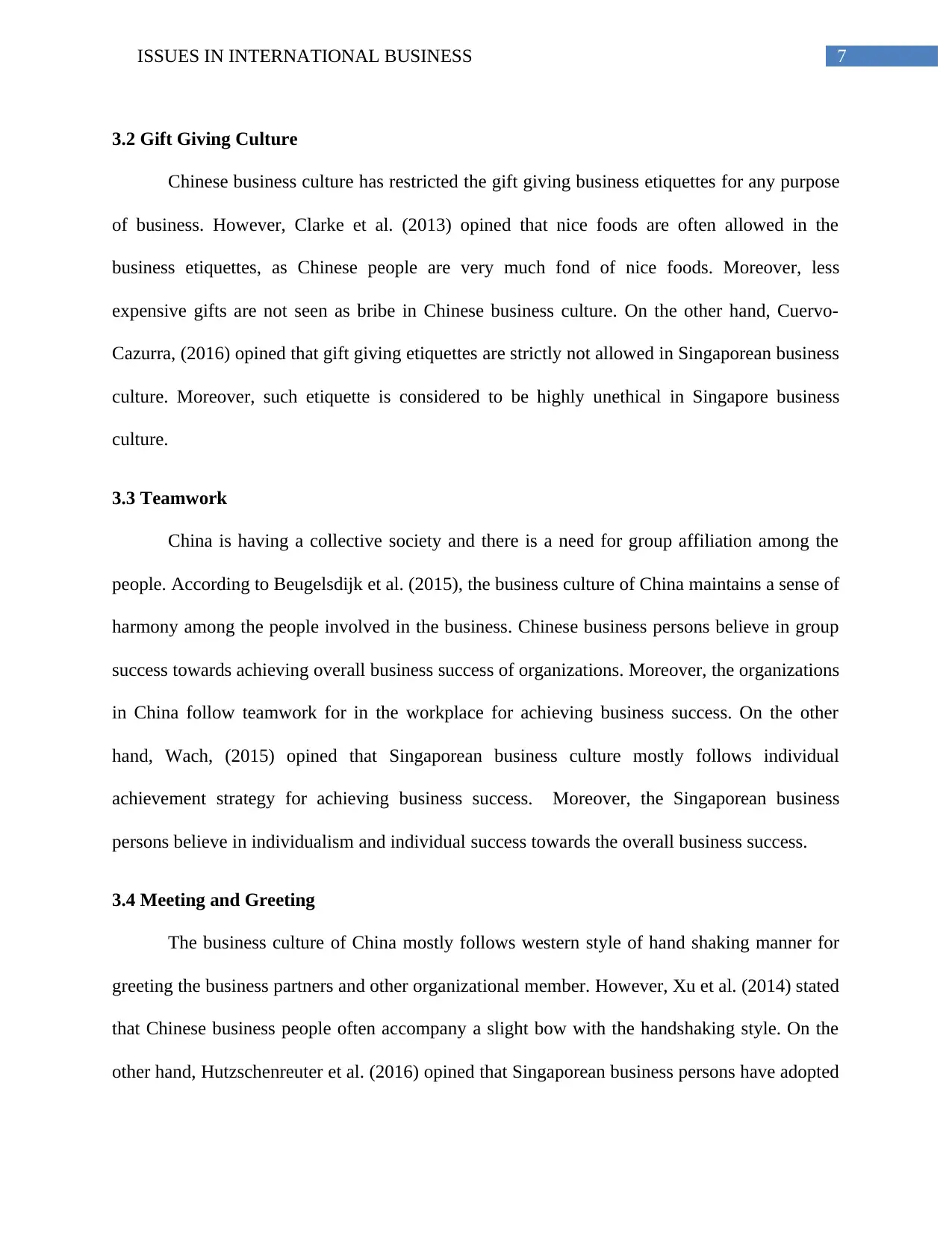
7ISSUES IN INTERNATIONAL BUSINESS
3.2 Gift Giving Culture
Chinese business culture has restricted the gift giving business etiquettes for any purpose
of business. However, Clarke et al. (2013) opined that nice foods are often allowed in the
business etiquettes, as Chinese people are very much fond of nice foods. Moreover, less
expensive gifts are not seen as bribe in Chinese business culture. On the other hand, Cuervo-
Cazurra, (2016) opined that gift giving etiquettes are strictly not allowed in Singaporean business
culture. Moreover, such etiquette is considered to be highly unethical in Singapore business
culture.
3.3 Teamwork
China is having a collective society and there is a need for group affiliation among the
people. According to Beugelsdijk et al. (2015), the business culture of China maintains a sense of
harmony among the people involved in the business. Chinese business persons believe in group
success towards achieving overall business success of organizations. Moreover, the organizations
in China follow teamwork for in the workplace for achieving business success. On the other
hand, Wach, (2015) opined that Singaporean business culture mostly follows individual
achievement strategy for achieving business success. Moreover, the Singaporean business
persons believe in individualism and individual success towards the overall business success.
3.4 Meeting and Greeting
The business culture of China mostly follows western style of hand shaking manner for
greeting the business partners and other organizational member. However, Xu et al. (2014) stated
that Chinese business people often accompany a slight bow with the handshaking style. On the
other hand, Hutzschenreuter et al. (2016) opined that Singaporean business persons have adopted
3.2 Gift Giving Culture
Chinese business culture has restricted the gift giving business etiquettes for any purpose
of business. However, Clarke et al. (2013) opined that nice foods are often allowed in the
business etiquettes, as Chinese people are very much fond of nice foods. Moreover, less
expensive gifts are not seen as bribe in Chinese business culture. On the other hand, Cuervo-
Cazurra, (2016) opined that gift giving etiquettes are strictly not allowed in Singaporean business
culture. Moreover, such etiquette is considered to be highly unethical in Singapore business
culture.
3.3 Teamwork
China is having a collective society and there is a need for group affiliation among the
people. According to Beugelsdijk et al. (2015), the business culture of China maintains a sense of
harmony among the people involved in the business. Chinese business persons believe in group
success towards achieving overall business success of organizations. Moreover, the organizations
in China follow teamwork for in the workplace for achieving business success. On the other
hand, Wach, (2015) opined that Singaporean business culture mostly follows individual
achievement strategy for achieving business success. Moreover, the Singaporean business
persons believe in individualism and individual success towards the overall business success.
3.4 Meeting and Greeting
The business culture of China mostly follows western style of hand shaking manner for
greeting the business partners and other organizational member. However, Xu et al. (2014) stated
that Chinese business people often accompany a slight bow with the handshaking style. On the
other hand, Hutzschenreuter et al. (2016) opined that Singaporean business persons have adopted
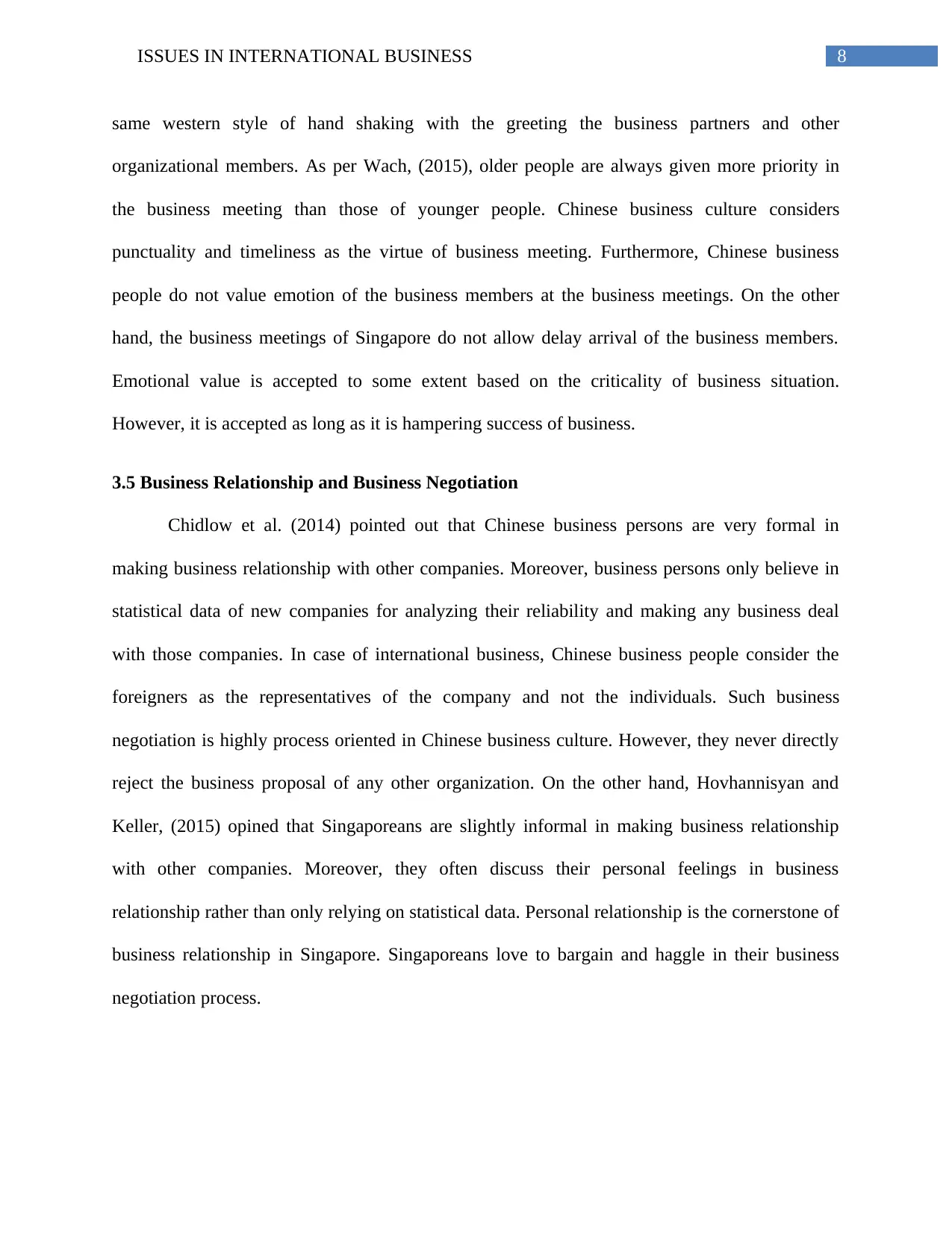
8ISSUES IN INTERNATIONAL BUSINESS
same western style of hand shaking with the greeting the business partners and other
organizational members. As per Wach, (2015), older people are always given more priority in
the business meeting than those of younger people. Chinese business culture considers
punctuality and timeliness as the virtue of business meeting. Furthermore, Chinese business
people do not value emotion of the business members at the business meetings. On the other
hand, the business meetings of Singapore do not allow delay arrival of the business members.
Emotional value is accepted to some extent based on the criticality of business situation.
However, it is accepted as long as it is hampering success of business.
3.5 Business Relationship and Business Negotiation
Chidlow et al. (2014) pointed out that Chinese business persons are very formal in
making business relationship with other companies. Moreover, business persons only believe in
statistical data of new companies for analyzing their reliability and making any business deal
with those companies. In case of international business, Chinese business people consider the
foreigners as the representatives of the company and not the individuals. Such business
negotiation is highly process oriented in Chinese business culture. However, they never directly
reject the business proposal of any other organization. On the other hand, Hovhannisyan and
Keller, (2015) opined that Singaporeans are slightly informal in making business relationship
with other companies. Moreover, they often discuss their personal feelings in business
relationship rather than only relying on statistical data. Personal relationship is the cornerstone of
business relationship in Singapore. Singaporeans love to bargain and haggle in their business
negotiation process.
same western style of hand shaking with the greeting the business partners and other
organizational members. As per Wach, (2015), older people are always given more priority in
the business meeting than those of younger people. Chinese business culture considers
punctuality and timeliness as the virtue of business meeting. Furthermore, Chinese business
people do not value emotion of the business members at the business meetings. On the other
hand, the business meetings of Singapore do not allow delay arrival of the business members.
Emotional value is accepted to some extent based on the criticality of business situation.
However, it is accepted as long as it is hampering success of business.
3.5 Business Relationship and Business Negotiation
Chidlow et al. (2014) pointed out that Chinese business persons are very formal in
making business relationship with other companies. Moreover, business persons only believe in
statistical data of new companies for analyzing their reliability and making any business deal
with those companies. In case of international business, Chinese business people consider the
foreigners as the representatives of the company and not the individuals. Such business
negotiation is highly process oriented in Chinese business culture. However, they never directly
reject the business proposal of any other organization. On the other hand, Hovhannisyan and
Keller, (2015) opined that Singaporeans are slightly informal in making business relationship
with other companies. Moreover, they often discuss their personal feelings in business
relationship rather than only relying on statistical data. Personal relationship is the cornerstone of
business relationship in Singapore. Singaporeans love to bargain and haggle in their business
negotiation process.
⊘ This is a preview!⊘
Do you want full access?
Subscribe today to unlock all pages.

Trusted by 1+ million students worldwide
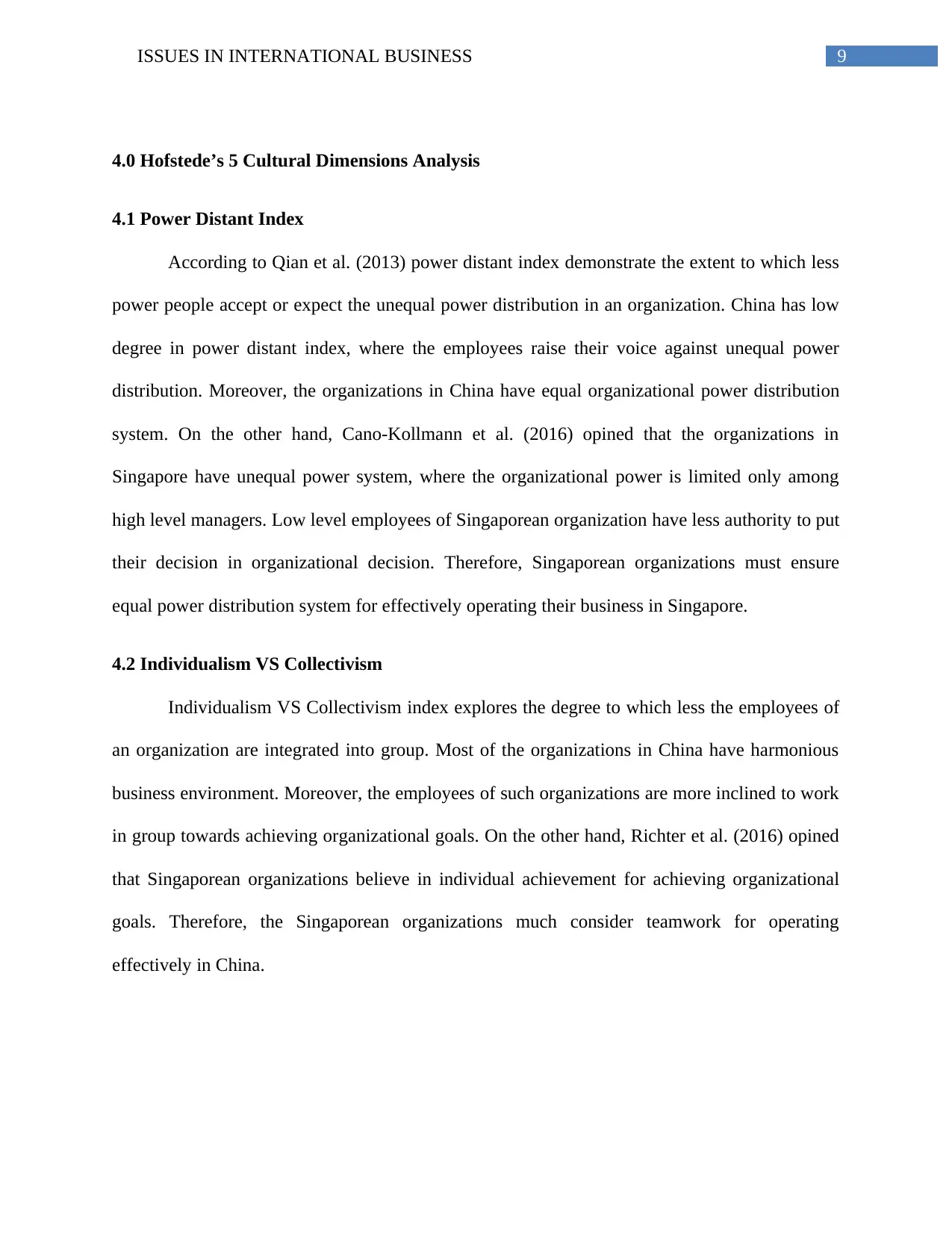
9ISSUES IN INTERNATIONAL BUSINESS
4.0 Hofstede’s 5 Cultural Dimensions Analysis
4.1 Power Distant Index
According to Qian et al. (2013) power distant index demonstrate the extent to which less
power people accept or expect the unequal power distribution in an organization. China has low
degree in power distant index, where the employees raise their voice against unequal power
distribution. Moreover, the organizations in China have equal organizational power distribution
system. On the other hand, Cano-Kollmann et al. (2016) opined that the organizations in
Singapore have unequal power system, where the organizational power is limited only among
high level managers. Low level employees of Singaporean organization have less authority to put
their decision in organizational decision. Therefore, Singaporean organizations must ensure
equal power distribution system for effectively operating their business in Singapore.
4.2 Individualism VS Collectivism
Individualism VS Collectivism index explores the degree to which less the employees of
an organization are integrated into group. Most of the organizations in China have harmonious
business environment. Moreover, the employees of such organizations are more inclined to work
in group towards achieving organizational goals. On the other hand, Richter et al. (2016) opined
that Singaporean organizations believe in individual achievement for achieving organizational
goals. Therefore, the Singaporean organizations much consider teamwork for operating
effectively in China.
4.0 Hofstede’s 5 Cultural Dimensions Analysis
4.1 Power Distant Index
According to Qian et al. (2013) power distant index demonstrate the extent to which less
power people accept or expect the unequal power distribution in an organization. China has low
degree in power distant index, where the employees raise their voice against unequal power
distribution. Moreover, the organizations in China have equal organizational power distribution
system. On the other hand, Cano-Kollmann et al. (2016) opined that the organizations in
Singapore have unequal power system, where the organizational power is limited only among
high level managers. Low level employees of Singaporean organization have less authority to put
their decision in organizational decision. Therefore, Singaporean organizations must ensure
equal power distribution system for effectively operating their business in Singapore.
4.2 Individualism VS Collectivism
Individualism VS Collectivism index explores the degree to which less the employees of
an organization are integrated into group. Most of the organizations in China have harmonious
business environment. Moreover, the employees of such organizations are more inclined to work
in group towards achieving organizational goals. On the other hand, Richter et al. (2016) opined
that Singaporean organizations believe in individual achievement for achieving organizational
goals. Therefore, the Singaporean organizations much consider teamwork for operating
effectively in China.
Paraphrase This Document
Need a fresh take? Get an instant paraphrase of this document with our AI Paraphraser
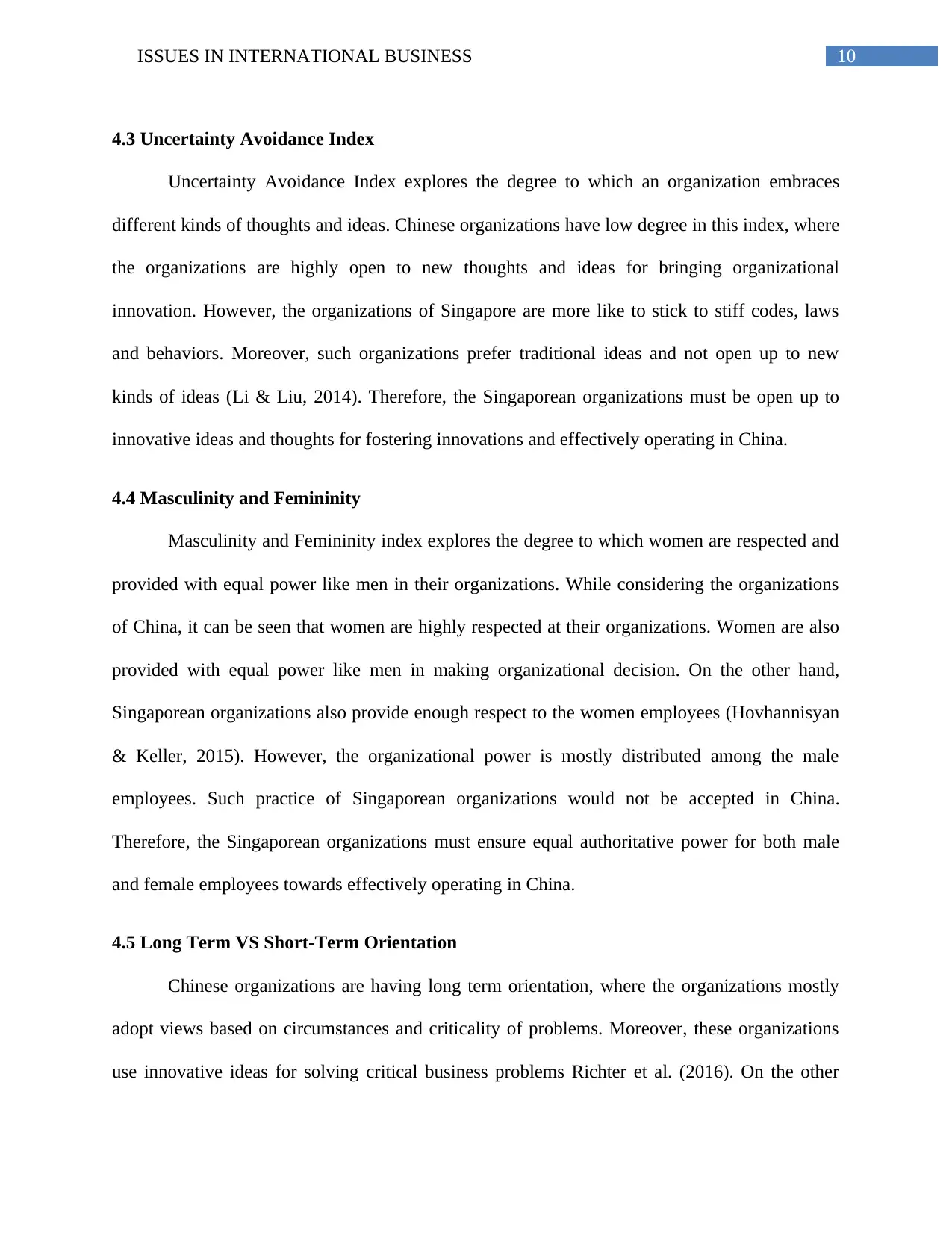
10ISSUES IN INTERNATIONAL BUSINESS
4.3 Uncertainty Avoidance Index
Uncertainty Avoidance Index explores the degree to which an organization embraces
different kinds of thoughts and ideas. Chinese organizations have low degree in this index, where
the organizations are highly open to new thoughts and ideas for bringing organizational
innovation. However, the organizations of Singapore are more like to stick to stiff codes, laws
and behaviors. Moreover, such organizations prefer traditional ideas and not open up to new
kinds of ideas (Li & Liu, 2014). Therefore, the Singaporean organizations must be open up to
innovative ideas and thoughts for fostering innovations and effectively operating in China.
4.4 Masculinity and Femininity
Masculinity and Femininity index explores the degree to which women are respected and
provided with equal power like men in their organizations. While considering the organizations
of China, it can be seen that women are highly respected at their organizations. Women are also
provided with equal power like men in making organizational decision. On the other hand,
Singaporean organizations also provide enough respect to the women employees (Hovhannisyan
& Keller, 2015). However, the organizational power is mostly distributed among the male
employees. Such practice of Singaporean organizations would not be accepted in China.
Therefore, the Singaporean organizations must ensure equal authoritative power for both male
and female employees towards effectively operating in China.
4.5 Long Term VS Short-Term Orientation
Chinese organizations are having long term orientation, where the organizations mostly
adopt views based on circumstances and criticality of problems. Moreover, these organizations
use innovative ideas for solving critical business problems Richter et al. (2016). On the other
4.3 Uncertainty Avoidance Index
Uncertainty Avoidance Index explores the degree to which an organization embraces
different kinds of thoughts and ideas. Chinese organizations have low degree in this index, where
the organizations are highly open to new thoughts and ideas for bringing organizational
innovation. However, the organizations of Singapore are more like to stick to stiff codes, laws
and behaviors. Moreover, such organizations prefer traditional ideas and not open up to new
kinds of ideas (Li & Liu, 2014). Therefore, the Singaporean organizations must be open up to
innovative ideas and thoughts for fostering innovations and effectively operating in China.
4.4 Masculinity and Femininity
Masculinity and Femininity index explores the degree to which women are respected and
provided with equal power like men in their organizations. While considering the organizations
of China, it can be seen that women are highly respected at their organizations. Women are also
provided with equal power like men in making organizational decision. On the other hand,
Singaporean organizations also provide enough respect to the women employees (Hovhannisyan
& Keller, 2015). However, the organizational power is mostly distributed among the male
employees. Such practice of Singaporean organizations would not be accepted in China.
Therefore, the Singaporean organizations must ensure equal authoritative power for both male
and female employees towards effectively operating in China.
4.5 Long Term VS Short-Term Orientation
Chinese organizations are having long term orientation, where the organizations mostly
adopt views based on circumstances and criticality of problems. Moreover, these organizations
use innovative ideas for solving critical business problems Richter et al. (2016). On the other
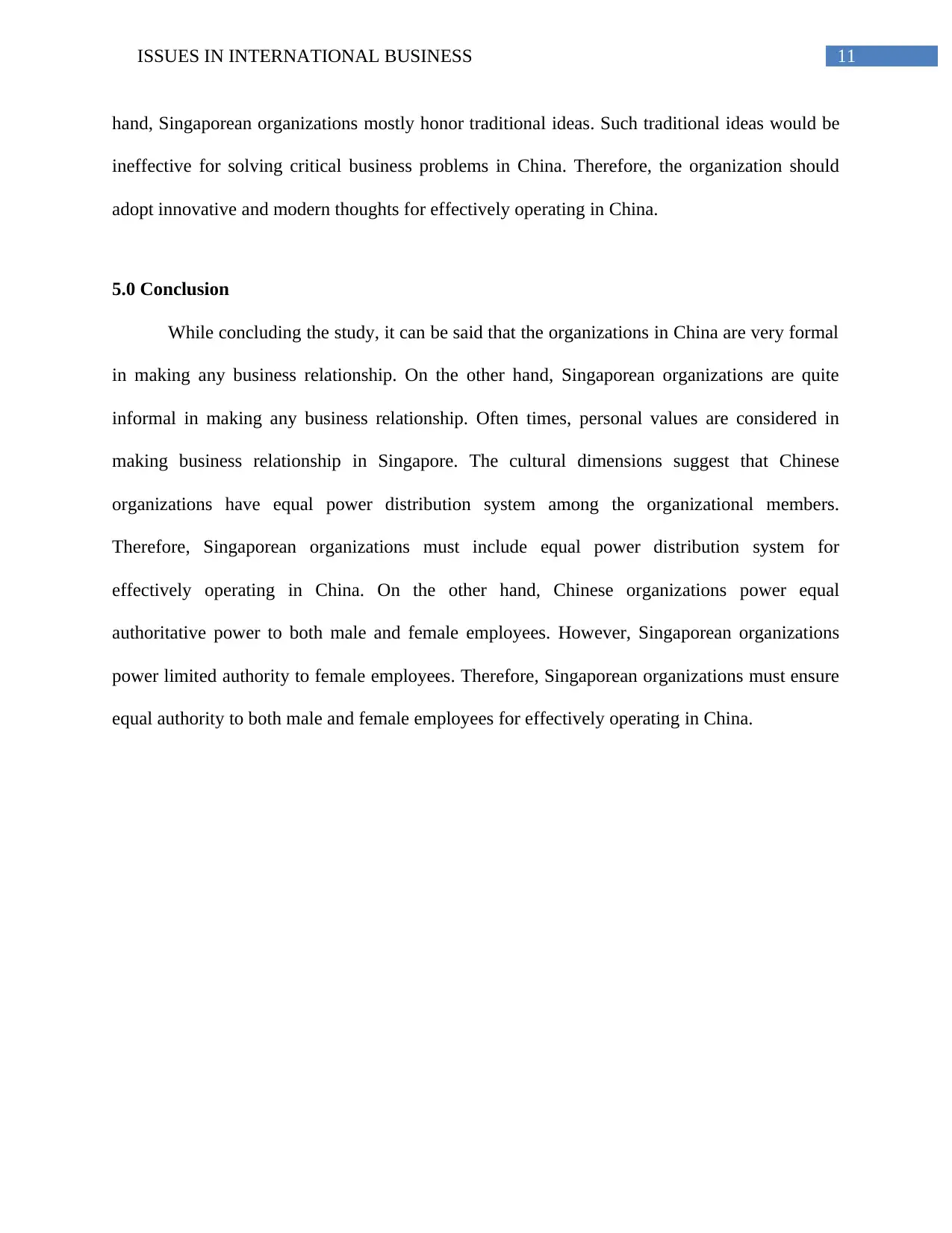
11ISSUES IN INTERNATIONAL BUSINESS
hand, Singaporean organizations mostly honor traditional ideas. Such traditional ideas would be
ineffective for solving critical business problems in China. Therefore, the organization should
adopt innovative and modern thoughts for effectively operating in China.
5.0 Conclusion
While concluding the study, it can be said that the organizations in China are very formal
in making any business relationship. On the other hand, Singaporean organizations are quite
informal in making any business relationship. Often times, personal values are considered in
making business relationship in Singapore. The cultural dimensions suggest that Chinese
organizations have equal power distribution system among the organizational members.
Therefore, Singaporean organizations must include equal power distribution system for
effectively operating in China. On the other hand, Chinese organizations power equal
authoritative power to both male and female employees. However, Singaporean organizations
power limited authority to female employees. Therefore, Singaporean organizations must ensure
equal authority to both male and female employees for effectively operating in China.
hand, Singaporean organizations mostly honor traditional ideas. Such traditional ideas would be
ineffective for solving critical business problems in China. Therefore, the organization should
adopt innovative and modern thoughts for effectively operating in China.
5.0 Conclusion
While concluding the study, it can be said that the organizations in China are very formal
in making any business relationship. On the other hand, Singaporean organizations are quite
informal in making any business relationship. Often times, personal values are considered in
making business relationship in Singapore. The cultural dimensions suggest that Chinese
organizations have equal power distribution system among the organizational members.
Therefore, Singaporean organizations must include equal power distribution system for
effectively operating in China. On the other hand, Chinese organizations power equal
authoritative power to both male and female employees. However, Singaporean organizations
power limited authority to female employees. Therefore, Singaporean organizations must ensure
equal authority to both male and female employees for effectively operating in China.
⊘ This is a preview!⊘
Do you want full access?
Subscribe today to unlock all pages.

Trusted by 1+ million students worldwide
1 out of 15
Related Documents
Your All-in-One AI-Powered Toolkit for Academic Success.
+13062052269
info@desklib.com
Available 24*7 on WhatsApp / Email
![[object Object]](/_next/static/media/star-bottom.7253800d.svg)
Unlock your academic potential
Copyright © 2020–2026 A2Z Services. All Rights Reserved. Developed and managed by ZUCOL.





